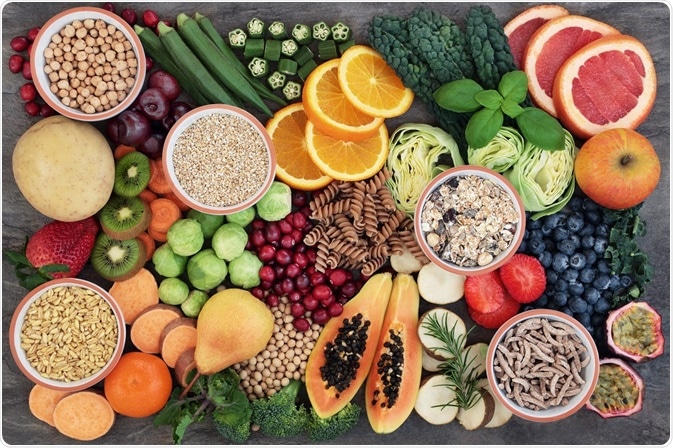
Unraveling the Wonders of Dietary Fiber: Nature’s Gift to Digestive Health
In the realm of nutrition, dietary fiber stands out as a hero often overshadowed by macronutrients like proteins, fats, and carbohydrates. However, this unassuming component plays a remarkable role in maintaining digestive health, supporting weight management, and promoting overall well-being. In this comprehensive exploration, we delve into the world of dietary fiber, uncovering its types, benefits, sources, and its vital role in optimizing human health.
Understanding Dietary Fiber
Dietary fiber, often referred to simply as “fiber,” is a complex carbohydrate that the human body cannot fully digest or absorb. Unlike other carbohydrates, fiber passes relatively intact through the digestive system, offering a multitude of benefits along the way. Dietary fiber is predominantly found in plant-based foods, including fruits, vegetables, whole grains, legumes, nuts, and seeds.
Types of Dietary Fiber
Dietary fiber can be classified into two main types based on its solubility in water:
1. Soluble Fiber
Soluble fiber has the unique property of forming a gel-like substance when it comes into contact with water. This type of fiber is associated with various health benefits, including:
- Heart Health: Soluble fiber helps lower LDL cholesterol levels by binding to cholesterol molecules and preventing their absorption.
- Blood Sugar Regulation: It slows down the digestion and absorption of carbohydrates, leading to more gradual rises in blood sugar levels.
- Gut Health: Soluble fiber serves as a prebiotic, providing nourishment for beneficial gut bacteria, which in turn supports digestive health and a balanced microbiome.
2. Insoluble Fiber
Insoluble fiber does not dissolve in water and adds bulk to the stool, aiding in the passage of food through the digestive tract. Its benefits include:
- Digestive Regularity: Insoluble fiber prevents constipation by promoting regular bowel movements and preventing stool from becoming too hard or too soft.
- Colon Health: It may reduce the risk of colorectal cancer by promoting a healthy environment in the colon and reducing exposure to harmful substances.
The Benefits of Dietary Fiber
The inclusion of dietary fiber in one’s diet offers a wide range of health advantages that extend beyond digestion:
1. Weight Management
Fiber-rich foods are often lower in calories and provide a feeling of fullness and satiety. This can lead to reduced calorie intake and support weight management efforts.
2. Heart Health
Soluble fiber’s ability to lower LDL cholesterol levels contributes to a reduced risk of heart disease. Additionally, fiber-rich diets are associated with lower blood pressure and inflammation levels.
3. Blood Sugar Control
Fiber-rich foods help regulate blood sugar levels by slowing down the absorption of sugar. This is particularly beneficial for individuals with diabetes or those at risk of developing the condition.
4. Digestive Health
Insoluble fiber aids in preventing constipation by promoting regular bowel movements. It also supports a healthy gut environment by feeding beneficial gut bacteria.
5. Disease Prevention
A high-fiber diet has been linked to a reduced risk of various chronic diseases, including colorectal cancer, type 2 diabetes, and certain cardiovascular conditions.
Sources of Dietary Fiber
Numerous plant-based foods are excellent sources of dietary fiber. Incorporating a variety of these foods into one’s diet can ensure an adequate intake of fiber:
- Fruits: Berries, apples, pears, and oranges are rich in soluble and insoluble fiber.
- Vegetables: Broccoli, carrots, Brussels sprouts, and sweet potatoes are high in fiber and contribute to overall nutrient intake.
- Whole Grains: Foods like whole wheat, oats, quinoa, and brown rice are excellent sources of dietary fiber.
- Legumes: Beans, lentils, chickpeas, and peas provide a substantial amount of both soluble and insoluble fiber.
- Nuts and Seeds: Almonds, chia seeds, flaxseeds, and sunflower seeds are nutritious additions to a high-fiber diet.
Incorporating More Fiber Into Your Diet
Making conscious choices to increase fiber intake can yield substantial health benefits. Here are some tips to help you incorporate more fiber into your diet:
- Choose Whole Grains: Opt for whole grain bread, pasta, and rice instead of their refined counterparts.
- Snack on Fruits and Vegetables: Keep cut-up fruits and veggies on hand for quick, fiber-rich snacks.
- Add Legumes: Include beans, lentils, and chickpeas in soups, salads, and stir-fries.
- Explore New Foods: Experiment with less common whole grains like quinoa, farro, and barley.
- Read Labels: Check food labels for fiber content and choose products with higher fiber content.
- Gradually Increase Intake: Gradually increase your fiber intake to avoid digestive discomfort, and make sure to drink plenty of water.
Conclusion
Dietary fiber is an unsung hero in the world of nutrition, playing a pivotal role in supporting digestive health, disease prevention, weight management, and overall well-being. The inclusion of fiber-rich foods in one’s diet is a simple yet powerful way to reap the numerous benefits it offers. By making conscious choices to consume a variety of fruits, vegetables, whole grains, legumes, nuts, and seeds, individuals can harness the potential of dietary fiber to optimize their health and vitality for years to come.



